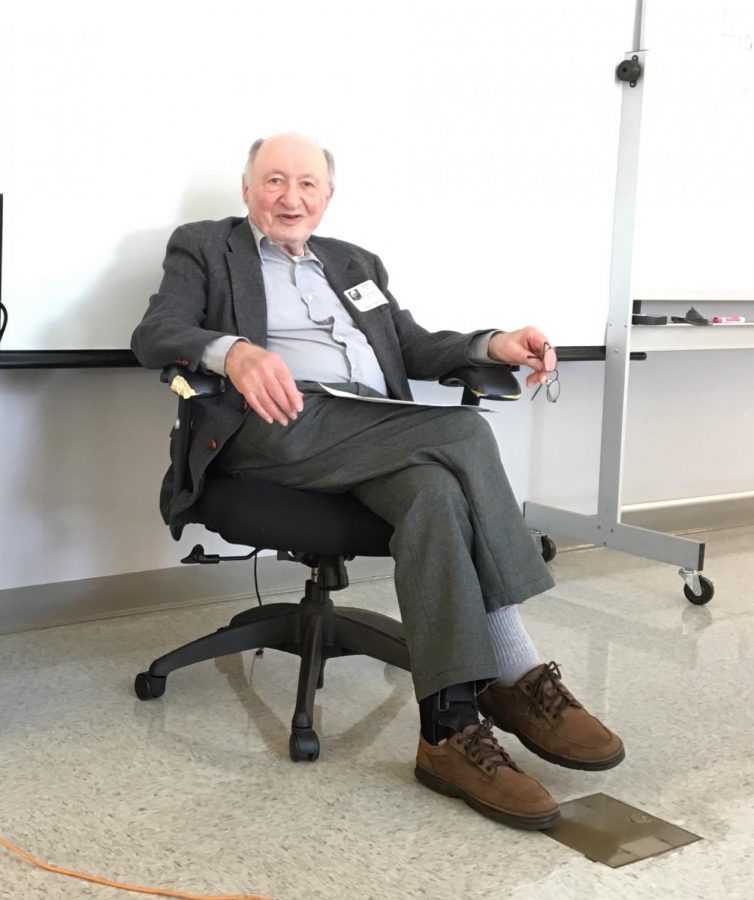Holocaust Survivor Shares His Story
Dr. Katz gives his moving speech to the psychology class
November 16, 2018
Dr. Fred Emile Katz, a survivor of the Holocaust, visited Oakdale on November 8. He came to share his life story to the Sociology and Psychology classes. During his speech, he explained his journey from a small village in Germany to England then the United States. He also told the classes how his experiences led him to study genocides scientifically.
He was born in a small village in Southern Germany, where he grew up in a small Jewish community. Early on, he realized the struggle of being a Jew as his classmates often beat him up simply for being who he was and told him that being Jewish was considered a sin. It was experiences like this that led to him leaving. He wanted to escape the discrimination he faced in his own town.
At the age of eleven, he left for England on the Kindertransport, a system organized by Quakers in order to help Jews flee persecution. After reflecting on these experiences, he explained he has since realized that he, “was blindfolded emotionally and mentally as a defense mechanism.”
After attending a refugee school where he learned English he lived temporarily with a woman named Ms. Karger, a German immigrant as well. She had left during the regime of Hitler, and had made it her duty to take in orphans and those looking for work.
During his stay, he had the privilege of meeting many successful scientists. They “drummed into me [I] must get more education,” especially with the confidence he thinks Karger instilled in him. She was a major role in his life, he would later dedicate his first book to her.
After becoming inspired, he decided to take hold of his education. He enrolled in college, and then graduate school.
Even after becoming a successful sociology professor, he still battled with a notion, whether or not he should visit his homeland. Fear of reliving those traumatic experiences plagued him, as did the unknown fate of his parents. Unfortunately, they were victims of the concentration camps. Thankfully, his sister was still alive, and his homeland greeted him with open arms. So, with his wife by his side, her returned home for the first time in decades.
After experiencing these horrific events, Dr. Katz has made it his purpose to make a difference and to study genocides in a new way. He explained, “We have to address genocide in ways that are different than the mainstream, rather than recounting the horrors we have to understand what different forms of genocide have in common.” This has been his topic of research for the past 40 years and he has published numerous books and given countless speeches on it.
Ms. Kate Ehrlich, the AP Psychology teacher at Oakdale, invited him to speak with her students, as well as Ms. Terri Kenney’s. She believes, “It’s interesting and important to see how these events we talk about in class impact individual people’s lives. I thought, that for the [psychology and sociology] kids, it’s also interesting to look at events we’ve talked about in a different perspective. In this case, to look at it and see what led to the Holocaust.”
She believes that, even years after the Holocaust, it’s still relevant in today’s world: “He actually talked about that, and how there’s genocides happening worldwide right now,” she provided many examples as well. “Look at Myanmar, they’ve got hundreds of Burmese Muslims who are being killed by the Buddhists there.”
In all of these situations, there’s similarities, the same type of injustices. Ehrlich tells, “He says there’s patterns that you see in all of these things. He focuses on what these movements have in common and how we can learn how to maybe prevent future problems.”
She felt incredibly moved by his speech thesis: “Just remembering things at the Holocaust, isn’t enough to prevent a future one. If we want to prevent future atrocities we need to understand of ordinary people got sucked into these movements.”
For those who would like to learn more about Dr. Katz and other Holocaust survivors, “In December, we’re going to have, on Main Street, an exhibit. It features him and is about the stories of a bunch of kids in the Holocaust, and what happened to them. They are all from his area of Germany.” For more information, ask Ms. Ehrlich in room B205.





























